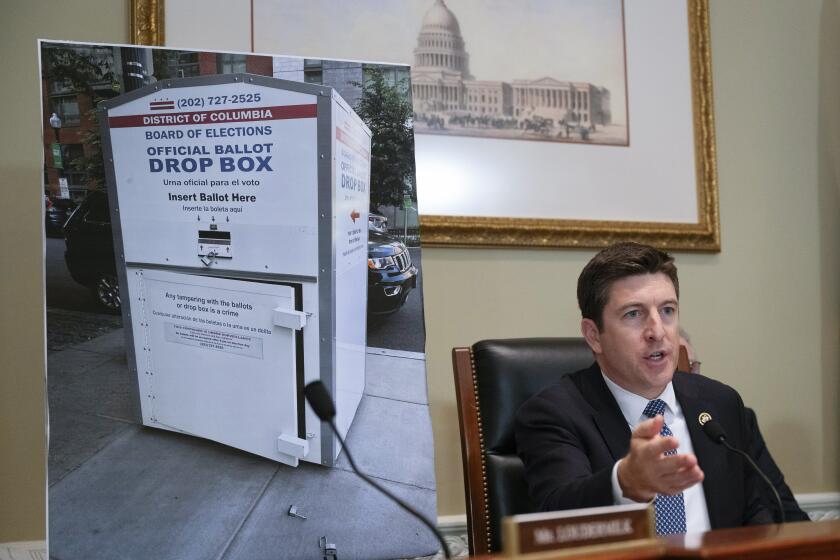Politics in Comic Strips: It’s No Funny Business to Many
Cartoons have come a long way since Popeye’s promotion of spinach was the most controversial cause to be found on the comics page. Today it’s not unusual to see weeks of strips devoted to such issues as homelessness, illiteracy and drug use, and politics has been a contemporary element since “Pogo” took on Washington more than two decades ago.
Jim Berry (“Berry’s World”) recently chided George Bush for ducking interviews. Garry Trudeau (“Doonesbury”) satirized the “it’s all over” belief being fed to the voting public by pollsters. Jules Feiffer observed the foibles of both presidential candidates, while “Rex Morgan MD” has tackled the cocaine problem and Tom Batiuk in “Funky Winkerbean” has zeroed in on teen-age pregnancy.
‘Cathy’ Strips Pulled
But a series of strips by Los Angeles cartoonist Cathy Guisewite, whose “Cathy” cartoon normally confines itself to baby boomer concerns about dating and child-rearing, has re-ignited the debate over just how argumentative the funnies page should be.
At least 20 papers of the 500-plus carrying “Cathy” have pulled or moved to the Op-Ed pages strips for this week and last, in which one cartoon character not only urges women to vote in Tuesday’s election but also takes on Republicans on issues ranging from child care to the environment.
Large newspapers that have pulled or moved strips include the Indianapolis News, the Portland Oregonian and the Albany (N.Y.) Times-Union. The Evansville (Ind.) Courier--in the home state of Sen. Dan Quayle, the GOP vice presidential candidate and a target in “Cathy”--is substituting “Cathy” re-runs for six strips it found offensive. The Los Angeles Times decided not to run strips that editors judged to be especially partisan--today’s, Thursday’s and Friday’s.
‘A Partisan Diatribe’
William Dowd, managing editor for features at the Albany paper, which pulled six “Cathy” strips, said, “We considered it a partisan diatribe and it mattered virtually not which side it was espousing.”
If Guisewite wanted to submit political commentary to the opinion page, he said, “we’d be more than happy to look at that.” But this was not what the paper contracted for with “Cathy” and “we thought they’d kind of sandbagged us.”
But at the Detroit Free Press, Marty Claus, managing editor for features, decided the strips should stay on the comics page. “We allow columnists a wide range of opinion,” she said. “Where would you draw the line? . . . I’d hate to be the one deciding.”
In her view, “you need a mix” in comics. “You need some comics that are relevant. You need some that are ‘Prince Valiant.’ You need some that are perfectly silly and preposterous. People are partisan. People are black and white. People are funny and serious.”
In one strip, cartoon character Cathy’s friend Andrea says, “We need (Democratic candidate Michael) Dukakis” because he supports a national day-care plan, equal pay for women and job-protected maternity leaves. She assails the GOP for cutting aid to education and money to help control water pollution.
Is there a double standard that permits political issues in “Doonesbury” but not in “Cathy”?
Not really, said Lee Salem, editorial director for Universal Press Syndicate, which distributes both strips. “Garry, of course, is accepted as a traditional satirist. Cathy, although she often deals directly with women’s issues, has certainly not done it before in this overt a manner.”
Guisewite agreed, adding that her newspaper subscribers “don’t expect me to be quite so pointed, and probably not so close to an election.”
Lou Schwartz, president of the Los Angeles Times Syndicate, said papers have trouble when a strip like “Cathy” endorses a candidate or a party because it’s so unexpected, somewhat like a sports columnist suddenly writing politics--”It’s not what they’re supposed to be doing.”
Need Not Be Passive
But in general, Salem said, “strips are becoming more topical and that may, or may not, include politics. Artists are coming to recognize that strips don’t necessarily have to be passive and bland.”
John Brownell, editor of The Times’ View section, said “public officials are always open to satire, and we’ll let cartoonists poke fun at them.” The distinction with the “Cathy” strips, he said, was that “they simply read like political ads, and rather heavy-handed ones at that.”
“Pogo” was among the first of the contemporary comics to take on politicians, noted Schwartz.
“A lot of people felt his caricature on (Sen. Joseph) McCarthy was one of the things that led to the fact that the McCarthy era sort of faded away.” “Pogo,” discontinued after Kelly’s death in 1973, will be revived next year by two Kelly family-approved artists and distributed through the Times syndicate.
In October, 100 cartoonists cooperated in the Cartoonists’ Homeless Project initiated by state Sen. David Roberti (D-Los Angeles) to call attention to the plight of the homeless through their art.
Emotional Stories
Batiuk, who also writes “Crankshaft,” has chosen adult illiteracy as “an ongoing theme” this year.
“I’m not going out looking for causes to write about,” he said, but “as a writer, I’m attracted to a powerful emotional story.”
While defending editors’ right to decide which strips to run, “I should be writing about things that are exciting and interesting and not dull,” he said. “I don’t like the idea of the cartoonist as Bozo the Clown. I want to be romantic, wistful, sexy, the whole thing.”
Richard Newcombe says he started Creators Syndicate in Los Angeles--which distributes “Crankshaft” and “B.C.”--two years ago on the premise that cartoonists are not “indentured servants.”
Some of the syndicate’s artists have ruffled feathers, notably, Batiuk with his illiteracy series and Doug Marlette (“Kudzu”) by having a teen-age character undergo a sex change operation, he said, adding that readers often protest that serious social problems have “no place at the family breakfast table in the funny papers.”
Had he handled “Cathy,” he would have given subscriber papers “plenty of advance warning. If you’re going to deviate too much from what you’ve sold, you’re asking for problems.” Universal should not have been surprised by the “Cathy” flap, he said, noting, “This is a comic strip that’s about dating and dieting, not Dukakis.”
Lynn Johnston, a sometimes-controversial Universal cartoonist (“For Better or For Worse”), said of the “Cathy” flap: “I would like to see the readers give their opinion. I think it’s unfair of an editor to pull her strip.” As for herself, she said, “I’m going to push my limits whenever I can because it’s more interesting that way.”
Not a Change in Direction
Guisewite insists the politicization of Cathy, her cartoon embodiment of everywoman in the ‘80s, does not signal a change in direction for the strip. She did it “just to get people talking about women’s issues in relationship to the candidates.” She said she “anticipated that these strips would get some reaction. They’ve gotten a bit more than I expected.”
But she said of the current ruckus: “I’m glad I did it. I knew going in that I ran the risk of alienating some readers (but) it was important enough . . . to weather the alienation.”
After Nov. 8, though Guisewite notes she occasionally will “go into some more serious things,” “Cathy” will revert to being “Cathy,” dealing with “more mundane things like cellulite and dating disasters.”
Her first post-election topic? “Housebreaking a puppy.”
More to Read
Start your day right
Sign up for Essential California for news, features and recommendations from the L.A. Times and beyond in your inbox six days a week.
You may occasionally receive promotional content from the Los Angeles Times.






